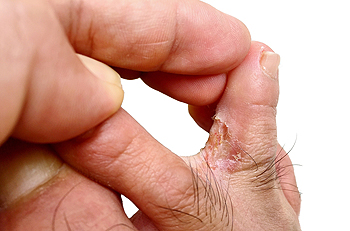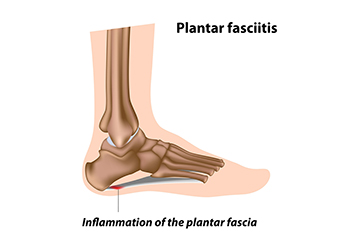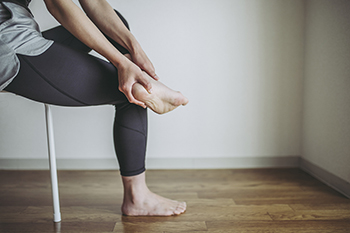Items filtered by date: November 2023
Exploring Causes and Symptoms of Athlete’s Foot

Athlete's foot, a common fungal infection, stealthily creeps into the lives of many, causing discomfort and irritation. The primary culprit behind this ailment is a group of fungi known as dermatophytes, which thrive in warm and moist environments. Shared spaces such as locker rooms, swimming pools, or communal showers become breeding grounds, facilitating the transmission of the infection. The symptoms of athlete's foot manifest in various ways, often starting with itching, burning, or stinging sensations between the toes. As the infection progresses, the skin may peel, crack, or develop blisters. In some cases, persistent fungal growth can lead to a distinctive, unpleasant odor. Recognizing the causes and symptoms is vital for swift intervention. If you have these symptoms of athlete’s foot, it is suggested that you visit a podiatrist who can successfully treat this condition in addition to educating you on effective prevention methods.
Athlete’s foot is an inconvenient condition that can be easily reduced with the proper treatment. If you have any concerns about your feet and ankles, contact Henrietta Obidigbo, DPM from Jersey Foot and Ankle Clinic. Our doctor will treat your foot and ankle needs.
Athlete’s Foot: The Sole Story
Athlete's foot, also known as tinea pedis, can be an extremely contagious foot infection. It is commonly contracted in public changing areas and bathrooms, dormitory style living quarters, around locker rooms and public swimming pools, or anywhere your feet often come into contact with other people.
Solutions to Combat Athlete’s Foot
- Hydrate your feet by using lotion
- Exfoliate
- Buff off nails
- Use of anti-fungal products
- Examine your feet and visit your doctor if any suspicious blisters or cuts develop
Athlete’s foot can cause many irritating symptoms such as dry and flaking skin, itching, and redness. Some more severe symptoms can include bleeding and cracked skin, intense itching and burning, and even pain when walking. In the worst cases, Athlete’s foot can cause blistering as well. Speak to your podiatrist for a better understanding of the different causes of Athlete’s foot, as well as help in determining which treatment options are best for you.
If you have any questions please feel free to contact our office located in Freehold, NJ . We offer the newest diagnostic and treatment technologies for all your foot and ankle needs.
Reminder: When Was the Last Time...?
Managing Excess Weight Affecting Feet and Ankles

Carrying extra weight can put additional strain on the feet, as they bear the body's load with every step. This increased pressure can lead to a range of foot conditions, including flattened arches, which may result in plantar fasciitis, a painful inflammation of the tissue along the bottom of the foot. It can also exacerbate the development of joint problems, such as osteoarthritis in the feet and ankles due to the higher demand placed on these areas. It is important to approach weight management and foot care gently and gradually. Taking small steps towards a healthier lifestyle, choosing supportive footwear, and engaging in gentle, low-impact exercises can help ease the strain on your feet. Remember to be patient and kind to yourself during this process. Positive change takes time, and self-compassion is key to a sustainable journey towards better health. If you are overweight and are experiencing foot pain of any kind, it is suggested that you make an appointment with a podiatrist who can help you with treatment, as well as provide effective tips on managing your weight for better overall health.
Obesity has become very problematic at this point in time and can have extremely negative effects on the feet. If you’re an obese individual and are concerned about your feet, contact Henrietta Obidigbo, DPM from Jersey Foot and Ankle Clinic. Our doctor can provide the care you need to keep you pain-free and on your feet.
Obesity and Your Feet
Since your feet are what support your entire weight when standing, any additional weight can result in pain and swelling. Being overweight is one of the main contributors to foot complications.
Problems & Complications
Extra Weight – Even putting on just a few extra pounds could create serious complications for your feet. As your weight increases, your balance and body will shift, creating new stresses on your feet. This uneven weight distribution can cause pain, even while doing the simplest tasks, such as walking.
Diabetes – People who are overweight are at serious risk of developing type-2 diabetes, which has a drastic impact on the health of your feet. As you get older, your diabetes might worsen, which could lead to loss of feeling in your feet, sores, and bruises. You could also become more prone to various infections.
Plantar fasciitis – Pressure and stress that is placed on muscles, joints, and tendons can trigger plantar fasciitis, which is an inflammation of tissue that forms along the bottom of the foot.
If you have any questions please feel free to contact our office located in Freehold, NJ . We offer the newest diagnostic and treatment technologies for all your foot and ankle needs.
Common Causes of Plantar Fasciitis Unveiled

Plantar fasciitis, a commn cause of heel pain, is a condition that occurs when the plantar fascia, a thick band of tissue that connects the heel bone to the toes, becomes inflamed and irritated. Several common factors contribute to the development of plantar fasciitis. One primary cause is excessive or repetitive strain on the feet. This often results from activities that place a significant burden on the plantar fascia, like prolonged standing, walking, or running, especially on hard surfaces. Footwear with inadequate arch support or cushioning can exacerbate the condition. Sudden weight gain or obesity is another contributing factor, as it places additional pressure on the feet. Tight calf muscles and Achilles tendons can also lead to plantar fasciitis by altering the mechanics of the foot, affecting the way it absorbs shock and distributes weight. Understanding these common causes is essential for both preventing and managing plantar fasciitis. If you have heel pain, it is strongly suggested that you are under the care of a podiatrist who can effectively diagnose and treat this condition.
Plantar fasciitis is a common foot condition that is often caused by a strain injury. If you are experiencing heel pain or symptoms of plantar fasciitis, contact Henrietta Obidigbo, DPM from Jersey Foot and Ankle Clinic. Our doctor can provide the care you need to keep you pain-free and on your feet.
What Is Plantar Fasciitis?
Plantar fasciitis is one of the most common causes of heel pain. The plantar fascia is a ligament that connects your heel to the front of your foot. When this ligament becomes inflamed, plantar fasciitis is the result. If you have plantar fasciitis you will have a stabbing pain that usually occurs with your first steps in the morning. As the day progresses and you walk around more, this pain will start to disappear, but it will return after long periods of standing or sitting.
What Causes Plantar Fasciitis?
- Excessive running
- Having high arches in your feet
- Other foot issues such as flat feet
- Pregnancy (due to the sudden weight gain)
- Being on your feet very often
There are some risk factors that may make you more likely to develop plantar fasciitis compared to others. The condition most commonly affects adults between the ages of 40 and 60. It also tends to affect people who are obese because the extra pounds result in extra stress being placed on the plantar fascia.
Prevention
- Take good care of your feet – Wear shoes that have good arch support and heel cushioning.
- Maintain a healthy weight
- If you are a runner, alternate running with other sports that won’t cause heel pain
There are a variety of treatment options available for plantar fasciitis along with the pain that accompanies it. Additionally, physical therapy is a very important component in the treatment process. It is important that you meet with your podiatrist to determine which treatment option is best for you.
If you have any questions, please feel free to contact our office located in Freehold, NJ . We offer the newest diagnostic and treatment technologies for all your foot care needs.
Unraveling the Mysteries Behind the Agony of Heel Pain

Heel pain is a common grievance that can impact people of all ages and lifestyles. To understand why it afflicts so many, it is essential to delve into its multifaceted causes. One of the primary culprits is plantar fasciitis, where the tissue connecting the heel to the toes becomes inflamed due to excessive strain, often stemming from prolonged standing, or from wearing improper footwear. Another common source of heel pain is Achilles tendonitis, an overuse injury affecting the tendon at the back of the heel, which can result from intense physical activities and inadequate rest. Heel spurs, small calcium deposits on the heel bone, can also trigger discomfort, often linked to conditions like plantar fasciitis. Additionally, various systemic diseases, such as arthritis, can manifest as heel pain. If you have heel pain for any reason, it is suggested that you visit a podiatrist who can determine what that cause is, and offer treatment options that are right for you.
Many people suffer from bouts of heel pain. For more information, contact Henrietta Obidigbo, DPM of Jersey Foot and Ankle Clinic. Our doctor can provide the care you need to keep you pain-free and on your feet.
Causes of Heel Pain
Heel pain is often associated with plantar fasciitis. The plantar fascia is a band of tissues that extends along the bottom of the foot. A rip or tear in this ligament can cause inflammation of the tissue.
Achilles tendonitis is another cause of heel pain. Inflammation of the Achilles tendon will cause pain from fractures and muscle tearing. Lack of flexibility is also another symptom.
Heel spurs are another cause of pain. When the tissues of the plantar fascia undergo a great deal of stress, it can lead to ligament separation from the heel bone, causing heel spurs.
Why Might Heel Pain Occur?
- Wearing ill-fitting shoes
- Wearing non-supportive shoes
- Weight change
- Excessive running
Treatments
Heel pain should be treated as soon as possible for immediate results. Keeping your feet in a stress-free environment will help. If you suffer from Achilles tendonitis or plantar fasciitis, applying ice will reduce the swelling. Stretching before an exercise like running will help the muscles. Using all these tips will help make heel pain a condition of the past.
If you have any questions please contact our office located in Freehold, NJ . We offer the newest diagnostic and treatment technologies for all your foot and ankle needs.





